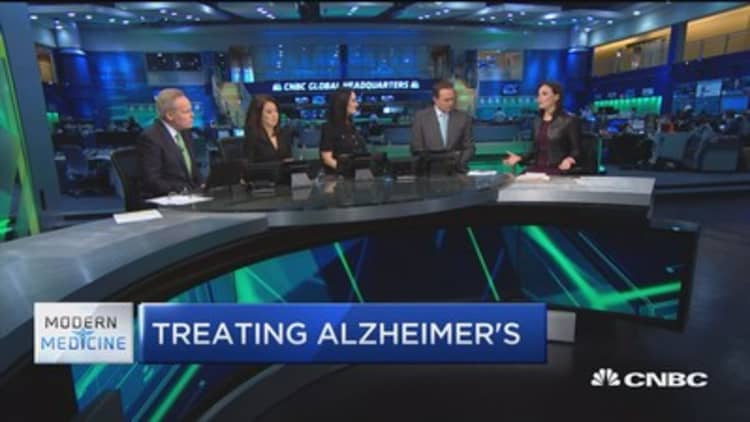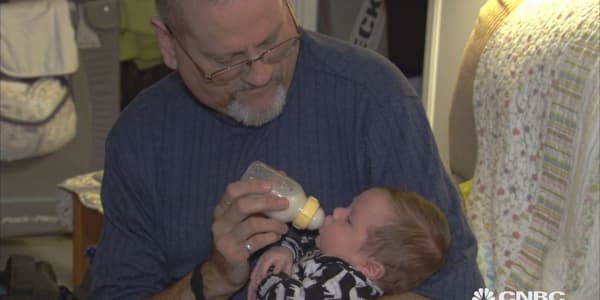For Mike Belleville, diagnosis of early-onset Alzheimer's three years ago was a call to action. A Massachusetts resident, Belleville began lobbying his state legislators. He even met with Democratic Senator Elizabeth Warren and asked her to fight for more Alzheimer's funding, because he knew he'd forget about it as his disease progressed.
"Advocacy means talking to anybody," said Belleville, who had to leave his technician job at Verizon when his abilities began to decline. "If we don't start solving it, Alzheimer's will bankrupt the country. People living with the disease lose a part of themselves every day."
Health advocates like Belleville have good reason to be worried, based on expert projections. Alzheimer's is currently the only top 10 disease, as a cause of death, that doesn't have a cure. And the numbers of people living with the disease are expected to nearly triple to 14 million in 2050, according to the National Institutes of Health.
Increasing budgets for Alzheimer research is an uphill battle, though.
NIH funding for the brain disease is far behind that of cancer. In 2016 the NIH's estimated budget for Alzheimer's was $910 million vs. $5.6 billion for cancer. The NIH has said that it wants more money for Alzheimer research.
Alzheimer's Greater Los Angeles recently sent alerts to its 24,000 advocates to push Congress to pass the budget. Dr. Debra Cherry, executive vice president of Alzheimer's Greater Los Angeles, said, "We want to accelerate a cure for Alzheimer's. So we try to flood our congresspeople and let them know that this is a passionate desire."
The just-passed congressional budget included a $400 million increase for Alzheimer's research at the NIH in fiscal 2017.
"There's currently no way to slow Alzheimer's progression," said Robert Egge, chief public policy officer at the Alzheimer's Association. "And Alzheimer's isn't robustly funded. Our advocates are aware that's our mission today."
More from Modern Medicine:
Firestorm brewing over synthetic human DNA
Could flashing light treat Alzheimer's?
Gut bacteria targeted as a Parkinson's cause
Egge figures that Alzheimer funding should be more than $2 billion to substantially bump up research for a complex disease. "Robust funding can lead to breakthroughs," he said. Well-funded research, for example, has helped heart disease and cancer see declining death rates.
Not curing the disease, though, could indeed bankrupt the nation. In 2017 the U.S. health and long-term care cost for Alzheimer's was $259 billion. That number is set to soar to $511 billion by 2020, according to the NIH.
"For every $100 that goes into research, we pay $16,000 in care for the disease," Egge said. "But we can change that story."
Sandra Miniutti, the head of marketing at charity watchdog and research company Charity Watchdog, said that the year-to-date declines in contributions to medical charities could be an unintended consequence of the focus on political giving since Trump's election — but there is no way to know if it will last. She did say the medical charities have seen decreased giving since the recession of 2008. "Most of the health charities have been pushing against declines since 2008 and didn't rebound like other charitable causes after the recession. ... Stability is the new 'up' in their fundraising numbers," Miniutti said.
With funding gaps in mind, organizations like the Alzheimer's Association and UsAgainstAlzheimer's are trying to turn a disease into a cause. They hold walkathons, lobby members of Congress, sign petitions and even have advocate toolkits.
Alzheimer's nonprofits have been slow compared to other medical nonprofits in adopting many of the successful strategies when it comes to marketing and mass fundraising. Unlike cancer, there's also a stigma around Alzheimer's, which affects fundraising turnouts. And the caregivers are stressed by these long-term illnesses.
"We haven't seen a new treatment for Alzheimer's in a decade," said Jill Lesser, chief strategy officer at UsAgainstAlzheimer's. "And the disease can last for a decade or more, bankrupting families." Its mission is finding a treatment or cure by 2020.

California, one of the few states that does Alzheimer's research, has even cut back its funding, said Dr. Frank LaFerla, dean of the Ayala School of Biological Science at University of California Irvine. "Almost all funding comes from the NIH now," he said.
Dr. LaFerla, who is waiting for his own Alzheimer research grants to be approved, is also an advocate. He also takes regular trips to Washington, D.C., to meet with members of Congress to push for more money that creates "a healthy ecosystem in the sciences that attracts new, young talent."
"Activists have been very effective in raising awareness," said Dr. Richard Hodes, director of the National Institute on Aging. "They work ... in many ways, including drug trials and funding."
He doesn't want to predict when a cure will be found, though. "The brain is the most complex system that we know," he said. "Circuits are being disrupted in different individuals and by different causes — much like cancer."
He thinks that Alzheimer's may need multiple treatments rather than a single, all-inclusive dose.
Dr. Hodes is also hopeful. In the past three or four years, he has seen more interest from the public, science and Congress for curing Alzheimer's. "And we've seen substantial increases in funding," he said.
Meanwhile, Belleville is preparing for Alzheimer's slow progression by creating a video of myself as he is now. "People can see how I used to be," he said. "And they'll think that it's the disease and not me."
— By Constance Gustke, special to CNBC.com





